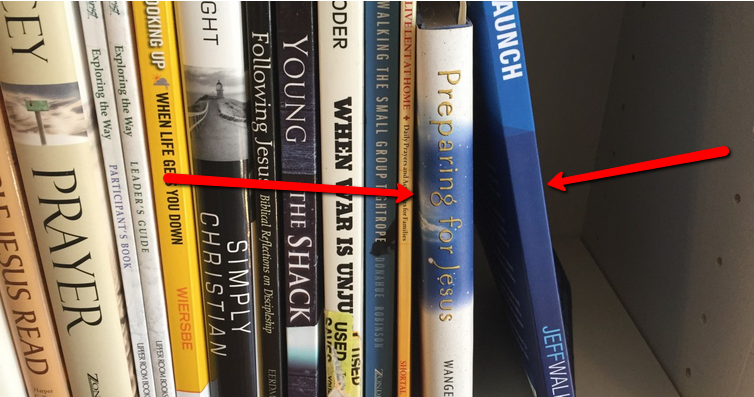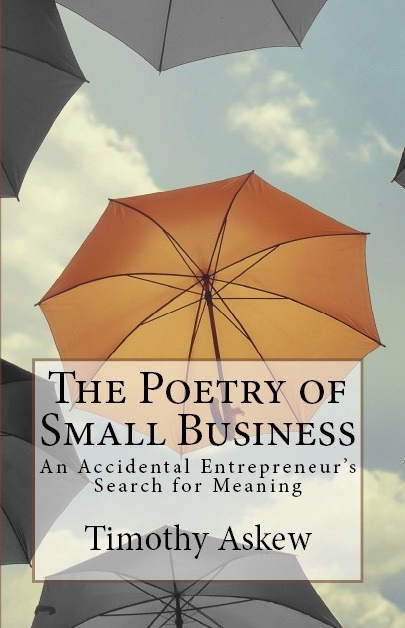The other day I walked past my bookshelf, and this juxtaposition caught my eye—two books that have no business being next to each other.
The one is an Advent devotional titled Preparing for Jesus: Meditations on the Coming of Christ, Advent, Christmas and the Kingdom by accomplished writer and National Book Award winner Walt Wangerin. The other is Launch: An Internet Millionaire’s Secret Formula to Sell Almost Anything Online, Build a Business You Love, and Live the Life of Your Dreams by self-made marketing expert Jeff Walker.
I was struck not only with the seemingly contradictory messages of these books but with the fact that there they stood—on my bookshelf! They were in some way emblematic of the internal conflict I feel so often.
Two Parts
On the one hand I long to be near my Maker, resting and communing in the dance of Divine Love. On the other I desperately want the businesses in which I’m involved to succeed, and succeed fabulously, thank you very much.
On the one hand I love the beautifully penned prose of a spiritual master. On the other I want to make a buck.
Give me poetry, but then don’t wait too long before giving me tools.
One impulse is all about living deeply and being spiritually attuned. The other is all about being successful in business and getting ahead and attaining the freedom that wealth affords.
And I’ve noticed that my friendships seem to head in one trajectory or another too. Not exclusively, of course, but primarily I have friends who support my spiritual pursuits, and I have other friends who support my entrepreneurial pursuits. And I value both equally.
For better or worse, this is just who I am. To deny one or the other part would be like hacking off limbs. In high school I was the drama geek who loved weight-lifting. Do you see what I’m getting at?
Don’t Call It Contradiction
So what am I to do with these apparently divergent parts of myself? What is any of us to do? I have worked with many, many authors who face a similar dichotomy. They want to write books of meaning and import, and they want people to read their books, yet they don’t want to be self-promoting.
How should we think about such contradictions?
Well, for one thing, I guess we should stop calling them contradictions. Does a spiritual impulse necessarily militate against an impulse to create and serve and make an income by doing so?
[Tweet “Does a spiritual impulse necessarily militate against an impulse to create and serve and make an income by doing so?”]
The other thing we must realize is there are different shades of motivation for either impulse. Wanting to commune with God is all good and fine and sounds super holy, but to what end? Is my doing so an act of love and gratitude, or is it an act of manipulation? Do I want to abide in God because of my love for God, or is it actually because I want God to run the world per my agenda? And do I read books like Launch merely because I want riches, or is it because I think I have something of real value to offer the world, and I want to be as strategic as possible about offering it?
You see, as soon as we start thinking one part of ourselves is good and the other bad, we do violence not only to ourselves but to reality. We must continually check our motives, but let’s not be too quick to write off sides of the self. We are whole people, endlessly complex, entire universes unto ourselves. And the God who saw fit to breathe life into clay is not taken aback. Not in the least.
We are free, friends. We are free to live out the different parts of who we are—always negotiating, yes, always careful, surely, but in confidence that it all needs redeeming anyway. And it so happens God knows something about redemption. He invented it.
Go in peace, good pilgrims.
[Tweet “Can We Be Both Spiritual and Successful? @ChadRAllen on reconciling our identities…”]
[reminder]Do you struggle with your desire to be both spiritual and successful?[/reminder]
Speaking of books, check out my free report: The Best Books Ever Written on Creativity, Writing, and Pursuing Your Dreams. Click the image below.










